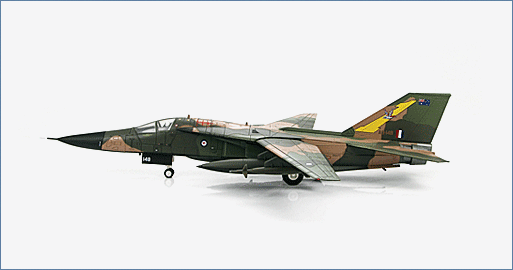Air Power Series>1:72 die-cast display model>F-111>HA3011
F-111C PIG A8-148, No. 1 Squadron, RAAF (camouflaged scheme)

General Background
The General Dynamics F-111 “Aardvark” entered service in 1967 as a medium-range aircraft designed for interdiction and tactical strikes. The F-111 was used as an all-weather attack aircraft capable of low-level penetration of enemy territory. It also could be used for reconnaissance and electronic warfare. Some unique features are variable geometry wings, the 2 crew members sat side by side in an escape capsule, internal weapons bay; terrain following radar and afterburning turbofans. The USAF retired their last F-111 in 1998 but the RAAF still use theirs.
The Aircraft
The RAAF ordered 24 F-111Cs that had serials A8-125 to A8-148. On September 4 1968 the
RAAF was handed the first F-111C but the advanced wing sweep mechanism has problems.
It wasn't until 1973 when the problem was solved and the RAAF acceptance was given. The
24 aircraft were delivered in 4 flights with the first flight arriving at Amberley on June 1, 1973.
The lead aircraft was A8-125 flown by Group Captain J.W. Newham and Wing Commander T.
C. Owen. A8-148, the last aircraft arrived on December 4, 1973. The aircraft was in service
with 1 Squadron and then transferred to 6 Squadron. A8-148's last live ordnance drop took
place on May 12-13, 2010. The aircraft was retired on December 3, 2010 and there is a
chance it may be heading for preservation.
Specifications :
| Role : | two-seat variable geometry, all-weather strike bomber |
| Entered service : | Ordered in 1963, Delivered in June 1973 |
| Crew : | 2 side by side in air conditioned and pressurized capsule. The capsule ejects to provide shelter and protection from outside elements |
| Powerplant : | 2 x Pratt & Whitney TF30-P103 two shaft axial flow turbofan engines rated @18,500 lb thrust with afterburners |
| Engine weight : | 4,062lb (1,843 kg) |
| Performance: | |
| Max Speed (clean) : | Mach 2.4 @ 40,000ft, Mach 1.1 @sea level |
| Typical range : | cruise 485 mph at 19,000ft |
| Climb rate (combat) : | 23,000ft/min |
| Ceiling Height : | 50,000 / 65,000ft (depending on weight) |
| Ferry range with internal fuel : | 3,700 miles |
| Dimensions : | |
| Length : | 73.6 ft (22.4 m) |
| Height : | 17.14 ft (5.22 m) |
| Wing area : | 550sq ft (51.1m2) |
| Wing Sweep : | 16 degrees (extended) - 70ft (21.33m) span |
| 72 degrees (full) sweep - 33ft 11.5in (10.35 m) | |
| Weights : | |
| Empty: | 55,275 lb (25,072 kg) |
| Loaded: | 70,000 lb (31,751 kg) |
| Maximum Takeoff: | 89,000 lb (40,370 kg) |
| Armament: | 1 x 20mm M61A1 Vulcan with 2,084 rounds. (No longer carried) |
| 4 x GBU-15, 2000lb T.V. Guided Bombs | |
| 4 x GBU-10, 2000lb Laser Guided bombs | |
| 4 x Mk.84, 2,000lb bombs | |
| 20 x Karinga cluster bomblet dispensers | |
| 24 x 25lb practice bombs | |
| 24 x 25 lb high-drag practice bombs | |
| 4 x Harpoon, radar guided anti shipping missiles | |
| 4 x GBU-12, 500lb Laser guided | |
| 20 x Mk.82 500lb iron bombs with high-drag tail attachment | |
| 24 x standard Mk.82 bombs | |
| Up to 6 x AIM-9 Sidewinder, Air-Air Missiles | |
| 6 x 600 gallon drop tanks | |
| The internal weapons bay can house either fuel, bombs or the AVQ-26 Pave Tack Target Designator |

